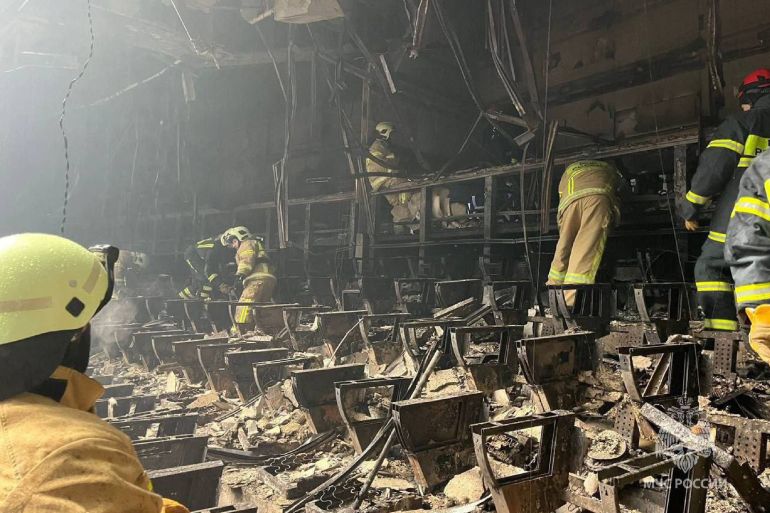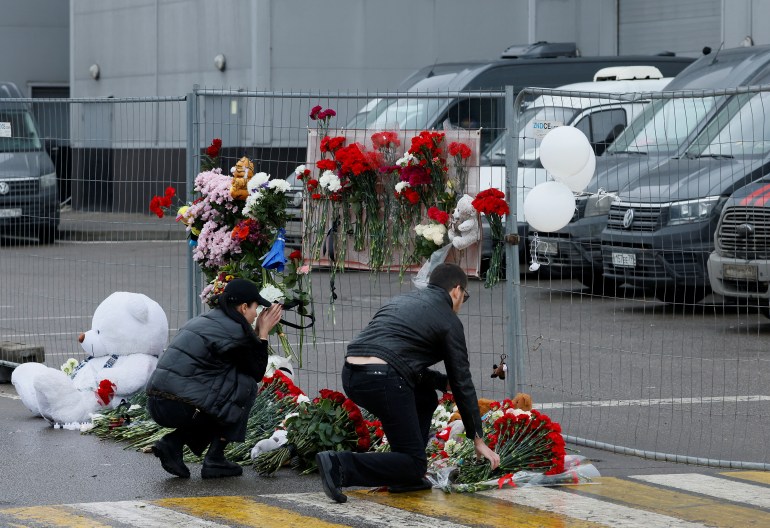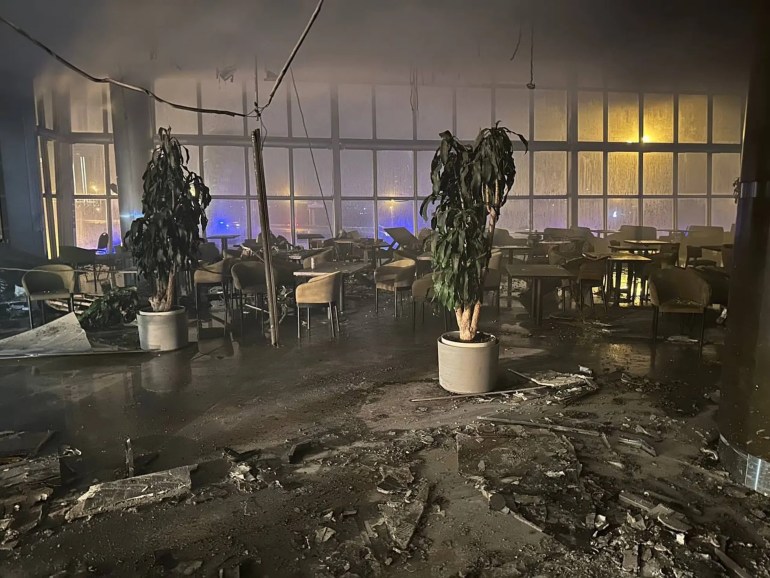Moscow concert hall attack: Russia detains 11 as death toll rises to 133
Russia’s Federal Security Service (FSB) tries to link Ukraine to assault despite ISIL affiliate claim of responsibility.

Russian authorities have detained 11 people in connection with a grisly attack in a packed concert hall near Moscow as the death toll climbed to 133, with more than 100 people injured.
On Saturday, Russia’s Investigative Committee said more bodies were found inside the Crocus City Hall in Moscow’s northern suburb of Krasnogorsk.
Keep reading
list of 3 itemsMoscow concert hall attack: Why is ISIL targeting Russia?
Moscow concert hall attack: What do we know so far?
The governor of the Moscow region, Andrei Vorobyov, who visited the venue on Saturday said: “As for the dead, I must say right away that the number of victims will grow significantly.”
Gunmen wearing combat fatigues opened fire with automatic weapons at the venue on Friday as concertgoers were preparing to watch a performance by Picnic, a veteran Soviet-era rock band.
An affiliate of ISIL (ISIS), Islamic State Khorasan Province (ISIS-K) that has been active in Afghanistan and Iran, claimed responsibility for the assault.
The authorities are yet to officially say who carried out the deadliest attack in Russia for at least a decade. In 2004, more than 330 people, half of them children, were killed in the Beslan school siege.
ISIS-K, which previously targeted the Russian embassy in Kabul, claimed that its fighters attacked “a large gathering” on Moscow’s outskirts and “retreated to their bases safely”.
In a televised address to the Russian people, President Vladimir Putin on Saturday called the attack a “barbaric terrorist act”. He said all the attackers had been arrested and vowed that those involved would be punished. He also declared Sunday as a day of national mourning.
The head of the Federal Security Service (FSB), Alexander Bortnikov, reported to Putin that those detained early on Saturday included four gunmen and investigations were continuing to identify their accomplices. Russia’s interior ministry said the four were all foreign citizens.
The investigative committee said people died from gunshot wounds and smoke inhalation after a fire engulfed the 6,000-seat venue.
“The terrorists used a flammable liquid to set fire to the concert hall’s premises, where spectators were located, including wounded,” it said.
Some 107 people were still in hospital on Saturday morning, according to Russia’s Emergency Situations Ministry.
‘Screaming, running’
Verified video showed people taking their seats in the hall, then rushing for the exits as repeated gunfire echoed above screams. Other footage showed men shooting at groups of people. Some victims lay motionless in pools of blood.
“Suddenly there were bangs behind us – shots. A burst of firing – I do not know what,” one witness, who asked not to be identified by name, told the Reuters news agency.
“A stampede began. Everyone ran to the escalator,” the witness said. “Everyone was screaming; everyone was running.”
Russian officials said security has been tightened at Moscow’s airports, railway stations and on the metro system. The mayor cancelled all mass gatherings, while theatres and museums in the area, home to more than 12 million people, were ordered shut for the weekend. Other Russian regions also tightened security.
Russian politician Alexander Khinshtein said the attackers had fled in a Renault vehicle that was spotted by police in the Bryansk region, about 340km (210 miles) southwest of Moscow on Friday night and disregarded calls to stop.
He said two people were arrested after a car chase and two others fled into a forest. From the Kremlin account, it appeared they, too, were later detained.
Khinshtein said a pistol, a magazine for an assault rifle, and passports from Tajikistan – a Central Asian state that used to be part of the Soviet Union – were found in the car.
ISIL involvement
ISIL posted a photo on one of its Telegram channels on Saturday claiming to show the four men who launched the attack. The group said the attack was part of ISIL’s “raging war” on countries fighting Islam.
Russian authorities have called it a “terrorist attack”, but have not commented on ISIL’s claim of responsibility.
Murat Aslan, a retired Turkish army colonel and military analyst said that ISIS-K has aims that span globally, not just in Central Asia.
“Previously, they were in Iran. Now they are in Moscow,” Aslan told Al Jazeera. “We will likely see more attacks in other capitals.”
Aslan said the group likely targeted Moscow in part because of Russia’s intervention in Syria, where Moscow supported President Bashar al-Assad against ISIL. “[ISIS-K] see such countries as hostile,” Aslan said.

The attack highlights how ISIL and ISIS-K have gained strength due to their ideological reach, according to Kabir Taneja, a fellow at the New Delhi-based Observer Research Foundation think tank, and the author of The ISIS Peril.
“ISIS-K in Afghanistan has grown in strength significantly,” Taneja told Al Jazeera. “And it’s not just ISIS-K, ISIL, in its original regions of operations, Syria and Iraq, also sees an uptick in operational capabilities.”
“ISIL today runs successfully in a form of existing in suspension, where it’s ideologically powerful even if not politically, tactically or strategically not that powerful any more,” he said.
Ukraine links
In his address on Saturday, President Putin said the assailants had all been detained after trying to “escape” to Ukraine, a comment that echoed earlier claims from the country’s security services that Ukraine may be involved.
Andrei Kartapolov, a lawmaker and former general, said Russia should retaliate on the battlefield if Ukraine is involved in the Moscow attack, Russia’s RIA Novosti news agency reported.
FSB maintained the perpetrators were en route to the border with Ukraine when they were apprehended, Russia’s Interfax news agency reported, adding that the suspects “had contacts” within Ukraine.
However, Ukraine’s presidential aide Mykhaylo Podolyak said: “It makes no sense whatsoever. Ukraine has never resorted to the use of terrorist methods.”
He posted on X that “we expected Russian officials’ version of the ‘Ukrainian trace’ in the terrorist attack in #CrocusCityHall”, calling it “untenable and absurd”.
Ukrainian President Volodymyr Zelenskyy, in his nightly video address on Saturday, said Putin was seeking ways to divert blame for the massacre by mentioning Ukraine.
Zelenskyy said it was “absolutely predictable” that Putin had remained silent for 24 hours before tying the shooting rampage to Ukraine and that the hundreds of thousands of “terrorists” Putin had sent to fight in Ukraine would “definitely be enough” to stop terrorists at home.
Warnings before the attack
Three days before the attack, Putin publicly dismissed Western warnings of an imminent attack in Moscow as propaganda designed to scare Russian citizens.
The White House said it received intelligence about a “planned terrorist attack” in Moscow earlier this month – “potentially targeting large gatherings, to include concerts” – and passed on the information to Moscow.
It did so as part of its “duty to warn” policy, in which the US alerts nations or groups when it receives intelligence of specific threats to kidnap or kill multiple victims, National Security Council spokesperson Adrienne Watson said.
Acknowledging receiving the warning from the US, a Russian security source said the information “did not contain specifics”, RIA Novosti reported.
The assault drew condemnation and shock from world leaders and the United Nations Security Council “condemned in the strongest terms the heinous and cowardly terrorist attack”.
